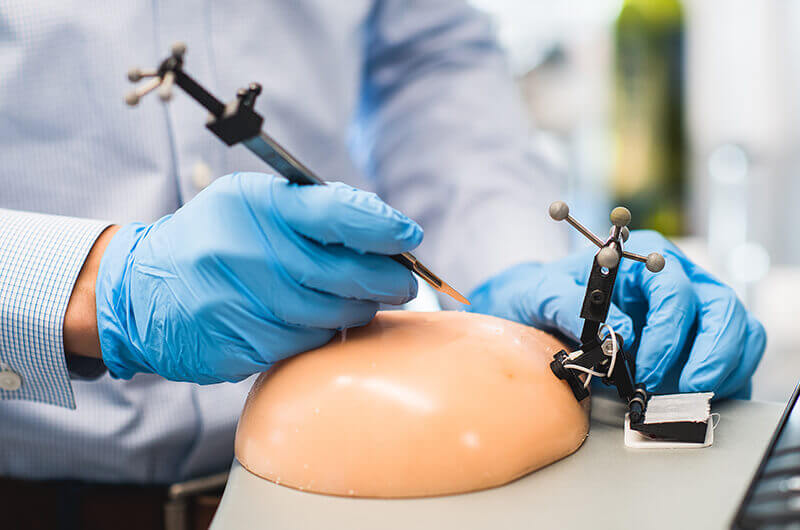June 18, 2019
NSF awards $700,000 to support technology shown to pinpoint breast cancer tumors during surgery, improve outcomes

Ji-Xin Cheng, a professor of electrical and computer engineering at Boston University, and Lu Lan, a biomedical engineering graduate research assistant at BU, monitor a tablet that displays Acoustar guidance to surgeons. Vibronix Inc., which Cheng helped start while he was a professor at Purdue University, is developing AcouStar to make it easier for surgeons to pinpoint breast cancer tumors. (Photo by Jackie Ricciardi for Boston University Photography)
Purdue startup receives funding aimed at reducing need for repeat surgeries
WEST LAFAYETTE, Ind. – A Purdue University-affiliated company developing a surgical tool shown to pinpoint breast cancer tumors so they can be removed faster and more accurately and reduce the need for repeat surgeries in nearly a quarter of all lumpectomies has received a National Science Foundation grant for $703,352.
Vibronix Inc. received a Small Business Innovation Research grant to advance the new technology called AcouStar. The company was founded by Ji-Xin Cheng, a professor of biomedical engineering and electrical and computer engineering at Boston University, who was formerly at Purdue, and Pu Wang, the company CEO, who received his doctorate from Purdue’s Weldon School of Biomedical Engineering.
According to the U.S. Centers for Disease Control and Prevention, breast cancer is the second most common cancer among women in the United States. About 237,000 women and 21,000 men are diagnosed with breast cancer each year in the United States, and about 41,000 women and 450 men die each year. Testing the AcouStar with a scalpel and sensor patch on a silicone “phantom.” Vibronix Inc., a Purdue University-affiliated company, is developing the surgical tool to help surgeons remove breast cancer tumors faster and more accurately. (Photo by Jackie Ricciardi for Boston University Photography)
Download image
Testing the AcouStar with a scalpel and sensor patch on a silicone “phantom.” Vibronix Inc., a Purdue University-affiliated company, is developing the surgical tool to help surgeons remove breast cancer tumors faster and more accurately. (Photo by Jackie Ricciardi for Boston University Photography)
Download image
Most people diagnosed with early-stage breast cancer choose either a lumpectomy, also known as breast-conserving surgery, or a mastectomy. Numerous studies have found similar survival rates for lumpectomies and mastectomies, according to the Susan G. Komen organization.
The problem for surgeons performing lumpectomies is that some tumors are so small they are hard to detect because they can’t be felt by hand. A study published in JAMA Oncology in 2017 found that 23.6 percent of breast cancer patients who underwent surgery needed a repeat surgery soon afterward because microscopic examination found that trace cancer cells were left behind.
Before surgery, doctors often insert a thin wire into a tumor to help guide them. But even with that guide, it is often difficult for the surgeon to locate the tumor because the tip of the wire is hard to find.
Using AcouStar, a doctor would use ultrasound or a mammogram to insert a carbon fiber-delivered optoacoustic emitter into the tumor. AcouStar sends nanosecond flashes of laser light that are then converted into sound. A detector is attached to the breast to locate the tip in the tumor using acoustic radar. The surgeon wears smart glasses that use augmented reality to see exactly were the tumor is. A video about the procedure is available here.
“The guide wire is like a beacon and able to help surgeons locate the tumor in a real-time manner,” Wang said. “The surgeon already has a plan on how to remove the tumor. They must be sure where it is. This technology helps them.”
Vibronix officials believe AcouStar will cut the costs of breast cancer surgery because doctors will be able to find the tumors more quickly and a second surgery won’t be needed as often. It also means less physical pain and distress for patients.
“AcouStar can effectively reduce the surgical delay and potentially minimize the re-excision rate,” Wang said. “Moreover, this innovative technology will not only be applicable for breast cancer surgery navigation, it may also be used as an internal tracking device for multiple other applications, such as implantable device tracking, endoscope tracking, navigation for partial kidney removal and other procedures.”
The NSF made the grant through a Phase II SBIR grant, also known as America’s Seed Fund. It is one of the largest sources of early-stage capital for technology commercialization in the country.
“The National Science Foundation supports startups and small businesses with the most innovative, cutting-edge ideas that have the potential to become great commercial successes and make huge societal impacts,” said Graciela Narcho, acting director of the Division of Industrial Innovation and Partnerships at NSF. “We hope that seed funding will spark solutions to some of the most important challenges of our time across all areas of science and technology.”
The funding will be used for research and development of the technology, which is patented through the Purdue Research Foundation’s Office of Technology Commercialization, Wang said.
Vibronix, which is based in the Purdue Research Park of West Lafayette, also has raised $1.7 million in investments from private sector and is looking to raise another $2 million to further develop the technology as it works to develop a wireless version of AcouStar.
The advantage of wireless is that the energy source can be placed in the tumor the day before the surgery, making it less stressful on the medical team and the patient. Vibronix also is looking for a partner to further develop the technology.
This technology aligns with Purdue's ‘Giant Leaps’ celebration, celebrating Purdue University’s global advancements made in health as part of Purdue’s 150th anniversary. This is one of the four themes of the yearlong celebration’s Ideas Festival celebrating the university’s global advancements.
About Purdue Research Park
The Purdue Research Park is managed by the Purdue Research Foundation and is the largest university-affiliated business incubation complex in the country. The Purdue Research Park manages the Purdue Technology Centers in five sites across the state of Indiana with locations in West Lafayette, Indianapolis, Merrillville and New Albany. The nearly 240 companies located in the park network employ about 6,000 people. In 2016, the Association of Public and Land-grant Universities co-named the Purdue Research Park a top recipient for an Innovation and Economic Prosperity Universities Designation for its work in entrepreneurship. For more information about leasing space in the Purdue Research Park, contact 765-588-3470 or click Purdue Research Park.
Writers: Nicole Pitti, 765-588-1065, njpitti@prf.org
Tom Coyne, 765-588-1044, tjcoyne@prf.org
Source: Pu Wang, puwang@vibronixinc.com

